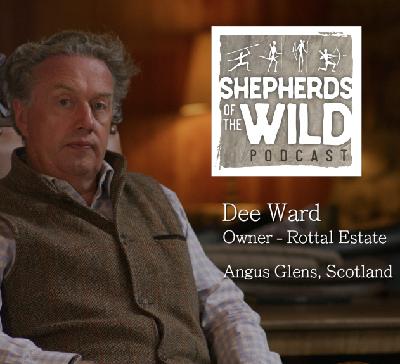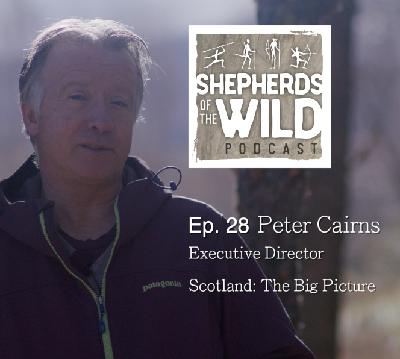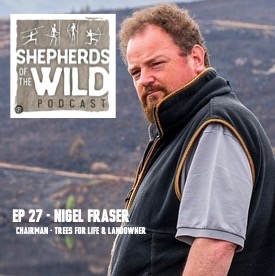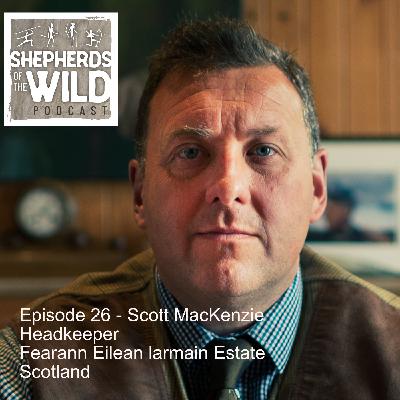Discover Shepherds of the Wild Podcast
Shepherds of the Wild Podcast

Shepherds of the Wild Podcast
Author: Tom Opre
Subscribed: 2Played: 21Subscribe
Share
Description
Host and filmmaker Tom Opre discusses dynamic topics with some of the most well-known and recognized experts on wildlife and habitat conservation. It’s a no holds barred, reality-based conversation about all the things Wild under man’s ever increasing shadow.
29 Episodes
Reverse
Dee Ward, the owner of the grouse moor Rottal Estate in the Angus Glens speaks with filmmaker Tom Opre about land management solutions he employs which consider both climate and biodiversity concerns.
Filmmaker Tom Opre talk to Scotland: The Big Picture executive director Peter Cairns about rewilding concepts, sporting estates, the rewilding economy, and how various stakeholders can find common ground.
Filmmaker Tom Opre and Photographer Tony Bynum speak with the chairman of the board for Tress for Life Nigel Fraser about rewilding, carbon sequestration, deer and red grouse management, and what will happen to the rural communities if the sporting estate model is regulated out of existence in the Scottish Highlands.
Listen to filmmaker Tom Opre and photographer Tony Bynum discuss land use issues and deer management with headkeeper at Fearann Eilean larmain Estate on the Isle of Skye, Scotland.
Filmmaker Tom Opre sits down with John Muir Trust CEO David Balharry to discuss Scotland's land use issues.
We speak with Scottish land reformer and retired politican Andy Wightman in Scotland.
Tom Opre sits down with Rajeev Mathews, a government contractor who has been monitoring and documenting the almost unknown facts about human-wildlife conflict (HWC) in India where approximately 10,000 people per year are attacked and killed by wildlife. He is a senior consultant with Zen Technologies Limited based in Hyderabad on developing various uses for armed and paramilitary forces. Serves as a knowledge partner with the Centre for Innovations in Public Systems (CIPS) Gov’t of India, on various aspects of the environment and has an MoU – memorandum of understanding – to deal with the ever-increasing human-wildlife conflicts. He serves as a member of the Wildlife Board for the state of Telangana. He is also a member of the Telangana State Biodiversity Board (TSBB) since its inception in 2014. He is an Expert Member of Red Sanders with the National Biodiversity Authority (NBA) based in Chennai, Tamil Nadu, and the Andhra Pradesh State Biodiversity Board (APSBB) 2014 from its inception. He has written several technical documents on various topics from wildlife to agriculture to habitats. He is a member of the Ethological Society of India (ESI) the Consortium of Indian Farmers’ Associations (CIFA). He is a life member of the Deccan Birders which was formerly the Birdwatchers’ Society of Andhra Pradesh (BSAP) since its inception in 1980.
Tom Opre speaks with John Shields, a supporter of community development in rural Zambia and a UK citizen, and scientific researcher and author Nikolaj Bichel from Denmark regarding the efforts of anti-use organizations and politicians to ban the import of hunting trophies in countries all over the world.
Host Tom Opre speaks with Mike Angelides, president of the African PH & Guides Association about deforestation in Tanzania. Mike has a lengthy history with the A.P.H.A. For the past 3 years, he was the Vice President. Mike previously held a board member position. Before that was the APHA Executive Officer, his other committee experience includes leadership positions as Secretary-General of the Tanzania Professional Hunters Association (TPHA) and Secretary General of Tanzania Hunting outfitters association (TAHOA), a position he still holds today.
Founder Tom Opre speaks with Professor Adam Hart on the issue of what exactly is conservation? Adam Hart is an ecologist, conservation scientist, and entomologist, and is the University of Gloucestershire Professor of Science Communication. As well as research and teaching, he is a regular broadcaster for BBC Radio 4 and the BBC World Service, presenting documentaries on topics from trophy hunting to tree diseases. He has also presented the weekly science program Science in Action for the BBC World Service. On television, Adam has co-presented several documentary series, most notably BBC4’s Planet Ant and BBC2’s Hive Alive. He has published more than 120 scientific papers and in 2023 his third popular science book, The Deadly Balance, was published in which he explores our complex relationship with predators. He is a Fellow and Trustee of the Royal Entomological Society, and in 2022 was announced as Vice President. Adam is also a Trustee of the Wild Planet Trust, a conservation charity that runs conservation programs in the UK and across the world.
At CITES CoP 19 in Panama, Shepherds of Wildlife Society founder Tom Opre had the opportunity to speak with Environmental Journalist Emmanuel Koro regarding his concerns related to neocolonialism, human rights, and racism in CITES and how CITES decisions negatively affect indigenous rural communities throughout southern Africa.
During the CITES CoP19 in Panama, host Tom Opre had the opportunity to interview Bupe Banda, a vibrant voice for community-based wildlife and habitat conservation in southern Africa.
Shepherds of Wildlife founder Tom Opre sat down with CITES Secretary-General Ivonne Higuero at CoP 19 in Panama City, Panama. She is an environmental economist with a career spanning 26 years in international organizations in the area of sustainable development. CITES is the treaty on the Convention on International Trade in Endangered Species of Wild Fauna and Flora. 184 countries are party to the convention which regulates the trade of wildlife which directly impacts indigenous rural communities.
This podcast is with award-winning outdoor and conservation writer Tom E. Opre. Tom wrote conservation, environmental, and outdoor articles over 24 years while working for the Detroit Free Press. He's the host father, and his work helped propel his son down the track he follows today through the Shepherds of Wildlife Society.
Tom Opre has an eye opening and important conversation about sustainable utilization with Alaskan subsistence trapper and guide Nate Turner. They cover Nate’s early years growing up in New York and then moving to his father’s trapline in the Alaskan bush. Nate also discusses what it’s like to live off the land and raise his family in remote Alaska.
Tom Speeze is the National Director for Field Conservation for the National Wild Turkey Federation. In this podcast, we discuss a wide arrange of land and wildlife management techniques and issues surrounding the Mirriam's Wild Turkey.
Tom Opre interviews Brian Wakeling the Game Management Bureau Chief of Montana Fish Wildlife and Parks about the management of the Mirriam's Turkey. This interview was used in his Tom's film "Mountain Thunder" a film for the National Wild Turkey Federation.
Tom Opre talks with Jim Posewitz, an icon in the ethics of hunting and wildlife conservation world. Jim had a long career as a wildlife biologists with the State of Montana before becoming a noted author. He is one of Montana's most respected conservationists who pioneered protections for fish and wildlife and was a nationally recognized voice on the ethics of hunting. They discuss the common ground between sportsman’s groups and animal lovers; Teddy Rosevelt’s conservation work; reseting ethics for the modern hunter; and how to keep wildlife conservation moving forward with a new generation of people who don’t have an outdoor tradition. Part 2 of 2.
Tom Opre meets with noted author and scientist Dr. Stuart Marks. Dr. Marks is a biologist, ecologist, economist, and philosopher. A Fulbright Scholar and son of a missionary dentist, Dr. Marks spent much of his early childhood living in the Congo, Africa. He has spent over 60 years studying the Bisa people of eastern Zambia and their relationship with wildlife. They also discuss Tom’s new film Killing the Shepherd; modern society’s disconnect with nature; China; Covid 19’s impact on Africa; ecosystem management; and our human future with an emphasis on exploitation of our natural resources.
























